热词翻译:“平等有序的世界多极化和普惠包容的经济全球化”英文怎么说?
“平等有序的世界多极化和普惠包容的经济全球化”英文怎么说?
根据热词译领导讲话翻译数据库,在《共谋和平发展 共筑金砖未来》的翻译中,“平等有序的世界多极化和普惠包容的经济全球化”被翻译为:
平等有序的世界多极化和普惠包容的经济全球化
an equal and orderly multipolar world and a universally beneficial and inclusive economic globalization
an equal and orderly multipolar world and a universally beneficial and inclusive economic globalization
例句如下:
当前,国际形势变乱交织,世界失序、增长失速、发展失衡、治理失焦。本届联大主题为“不让任何人掉队”,凸显各方对世界更加平等、安全、繁荣的期待。作为“全球南方”的第一方阵,金砖国家应当树立“立己达人、兼善天下”的情怀,为促进平等有序的世界多极化和普惠包容的经济全球化作出我们的贡献。
The current international situation is marked by change and instability, and the world is experiencing disorder, slowing growth, uneven development, and a loss of focus in governance. The theme of this year’s General Debate—“Leaving no one behind”—highlights the widely shared aspiration for greater equality, security and prosperity in our world. As leading members of the Global South, we BRICS countries should pursue our own success while promoting the greater good, and make our contribution to an equal and orderly multipolar world and a universally beneficial and inclusive economic globalization.
The current international situation is marked by change and instability, and the world is experiencing disorder, slowing growth, uneven development, and a loss of focus in governance. The theme of this year’s General Debate—“Leaving no one behind”—highlights the widely shared aspiration for greater equality, security and prosperity in our world. As leading members of the Global South, we BRICS countries should pursue our own success while promoting the greater good, and make our contribution to an equal and orderly multipolar world and a universally beneficial and inclusive economic globalization.
热词链接
“平等有序的世界多极化和普惠包容的经济全球化”在其他来源中的翻译:
1 《2025年11月28日外交部发言人毛宁主持例行记者会》中“平等有序的世界多极化和普惠包容的经济全球化”的翻译
在党中央坚强领导下,我们高举构建人类命运共同体旗帜,倡导平等有序的世界多极化和普惠包容的经济全球化,落实四大全球倡议,推动全球治理体系变革向着更加公正合理的方向发展,拓展全球伙伴关系网络,推动高质量共建“一带一路”。我们坚定维护国家主权、安全、发展利益,积极践行外交为民。中国特色大国外交全面推进,中国的国际影响力、创新引领力、道义感召力不断提升。
Under the strong leadership of the CPC Central Committee, we in the diplomatic service hold high the banner of building a community with a shared future for humanity, advocate an equal and orderly multipolar world and a universally beneficial and inclusive economic globalization, implement the Global Development Initiative, the Global Security Initiative, the Global Civilization Initiative and the Global Governance Initiative, work to build a more just and equitable global governance system through reform, expand the global network of partnerships and advance the high-quality Belt and Road cooperation. We on the diplomatic front firmly uphold national sovereignty, security and development interests, and actively act on the abiding commitment of serving the people through diplomacy. As the major-country diplomacy with Chinese characteristics is advancing on all fronts, China enjoys enhanced international influence, stronger capacity to lead new endeavors, and greater moral appeal.
Under the strong leadership of the CPC Central Committee, we in the diplomatic service hold high the banner of building a community with a shared future for humanity, advocate an equal and orderly multipolar world and a universally beneficial and inclusive economic globalization, implement the Global Development Initiative, the Global Security Initiative, the Global Civilization Initiative and the Global Governance Initiative, work to build a more just and equitable global governance system through reform, expand the global network of partnerships and advance the high-quality Belt and Road cooperation. We on the diplomatic front firmly uphold national sovereignty, security and development interests, and actively act on the abiding commitment of serving the people through diplomacy. As the major-country diplomacy with Chinese characteristics is advancing on all fronts, China enjoys enhanced international influence, stronger capacity to lead new endeavors, and greater moral appeal.
2 《2025年11月27日外交部发言人郭嘉昆主持例行记者会》中“平等有序的世界多极化和普惠包容的经济全球化”的翻译
发布新版军控白皮书,是中国积极践行全球安全倡议、全球治理倡议的具体举措。无论国际风云如何变幻,中国将始终站在和平一边,站在正义一边,始终是维护世界和平与安全的坚定力量。中国愿同所有爱好和平的国家一道,倡导平等有序的世界多极化和普惠包容的经济全球化,巩固和发展以联合国为核心的国际军控体系,携手构建人类命运共同体。
Releasing the new white paper on arms control is a concrete measure for China to actively practice the Global Security Initiative and the Global Governance Initiative. No matter how the international landscape evolves, China will always stand on the side of peace and justice and is a staunch force for safeguarding world peace and security. China is willing to work with all peace-loving countries to advocate an equal and orderly multipolar world and a universally beneficial and inclusive economic globalization, consolidate and develop the international arms control system with the United Nations at its core, and build a community with a shared future for humanity.
Releasing the new white paper on arms control is a concrete measure for China to actively practice the Global Security Initiative and the Global Governance Initiative. No matter how the international landscape evolves, China will always stand on the side of peace and justice and is a staunch force for safeguarding world peace and security. China is willing to work with all peace-loving countries to advocate an equal and orderly multipolar world and a universally beneficial and inclusive economic globalization, consolidate and develop the international arms control system with the United Nations at its core, and build a community with a shared future for humanity.
3 《2025年10月31日外交部发言人郭嘉昆主持例行记者会》中“平等有序的世界多极化和普惠包容的经济全球化”的翻译
中国一贯奉行独立自主的和平外交政策。作为最大的发展中国家、不结盟运动的伙伴、全球南方的一员,中国始终站在广大发展中国家一边,将继续践行真正的多边主义,同各国共同维护以世贸组织为核心的多边贸易体制,恪守《联合国宪章》和国际关系基本准则,推进平等有序的世界多极化和普惠包容的经济全球化,为世界注入更多确定性和稳定性。
China follows an independent foreign policy of peace. As the largest developing country, a partner of the Non-Aligned Movement and a member of the Global South, China will forever stand together with fellow developing countries. China will continue to practice true multilateralism, and work with other countries to uphold the multilateral trading system with the WTO at its core, abide by the UN Charter and the basic norms of international relations, work for an equal and orderly multipolar world and a universally beneficial and inclusive economic globalization, and provide more certainty and stability to the world.
China follows an independent foreign policy of peace. As the largest developing country, a partner of the Non-Aligned Movement and a member of the Global South, China will forever stand together with fellow developing countries. China will continue to practice true multilateralism, and work with other countries to uphold the multilateral trading system with the WTO at its core, abide by the UN Charter and the basic norms of international relations, work for an equal and orderly multipolar world and a universally beneficial and inclusive economic globalization, and provide more certainty and stability to the world.

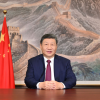 国家主席习近平发表二〇二六年新年贺词
国家主席习近平发表二〇二六年新年贺词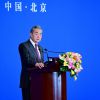 在历史演进重大关头开拓中国特色大国外交新境界
在历史演进重大关头开拓中国特色大国外交新境界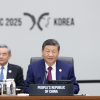 习近平在亚太经合组织第三十二次领导人非正式会议第一阶段会议上的讲话
习近平在亚太经合组织第三十二次领导人非正式会议第一阶段会议上的讲话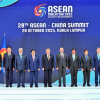 李强在第28次中国—东盟领导人会议上的讲话
李强在第28次中国—东盟领导人会议上的讲话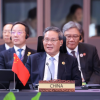 李强在第20届东亚峰会上的讲话
李强在第20届东亚峰会上的讲话